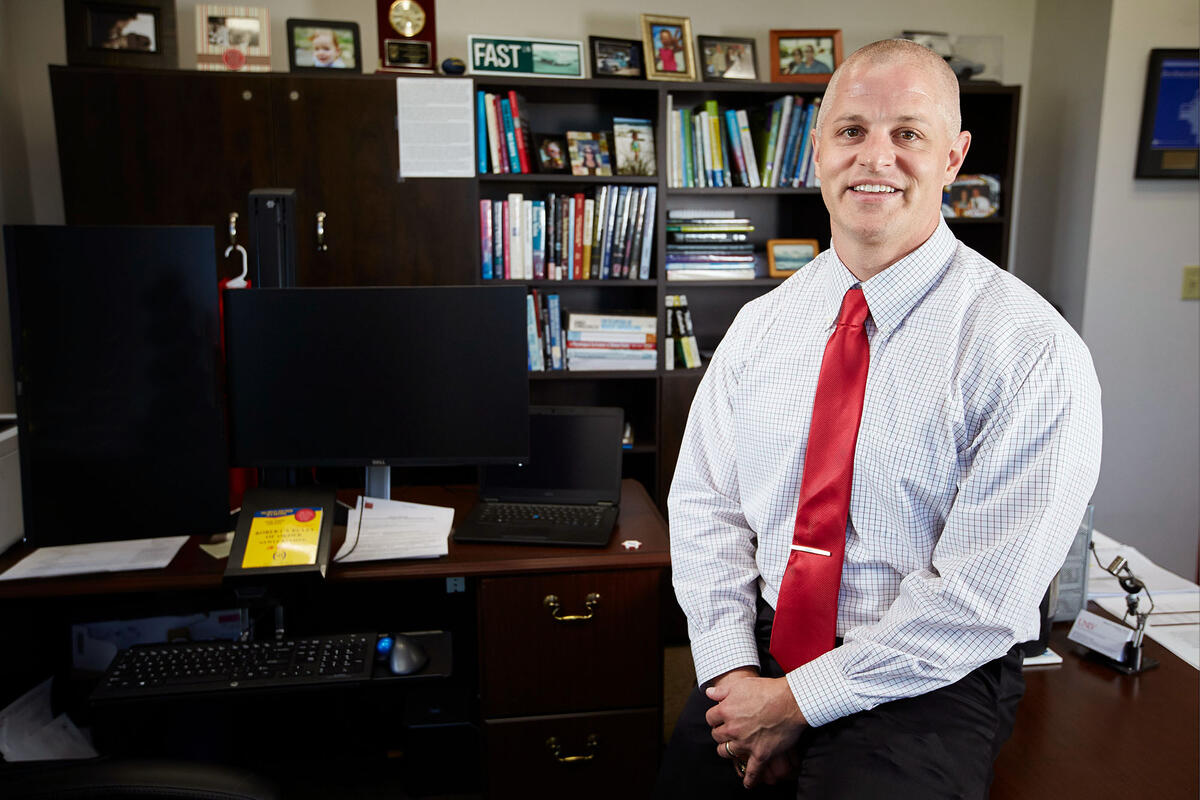Brian Schilling has a passion for movement, specifically the kinesiology of human beings, and cruising down the highway in a remodeled ’57 International Harvester pickup. The latter is a project for the future; the former brought him to his present role at UNLV.
Why UNLV?
During 2011, I began looking at multiple kinesiology and exercise sciences Ph.D. programs across the country and UNLV caught my attention. The university offered a vibrant culture of teaching and research that, for me, is a hallmark of solid Ph.D. program. I applied for an associate professor’s position and was fortunate to receive an interview. However, I was unable to join the program due to a family emergency. When another opportunity presented itself, I immediately applied. I feel UNLV has tons of potential, and I am proud to be part of its growth.
Where did you grow up?
I grew up in the tiny town of Edgar, which is in the heart of central Wisconsin’s dairy country. My grandparents were farmers and I spent a lot of time working on the farm.
What’s the biggest misconception about your field?
The biggest misconception about kinesiology and nutrition is that they are pseudo-sciences. There is a lot of snake oil in the exercise, sport, and nutrition fields that continues to detract from the evidence-based work of these scientific fields.
What inspired you to get into your field?
Like most people of my generation, I got into this field because I was an athlete (football as an undergraduate and Olympic-style weight lifting during graduate school) and became interested in human performance. I find interesting that current (students) are approaching degree paths more from a health care standpoint than an athletic bent. I enjoy the continuum of interests in our field that ranges from high-level athletes to clinical populations, and consider myself fortunate to work within that continuum.
Proudest moment in your life?
This question is easy to answer: the moment my wife Leslie said “I do.” She is my rock, and the best partner and mother to our daughter I could imagine.
One tip for success?
I feel that operating with an “abundance mentality” is the best tip for success. There are plenty of accolades and benefits to go around. Too often, we operate with a “scarcity mentality,” which sucks the joy out of our own successes and that of others.
What would people be surprised to know about you?
Some might be surprised to know that I am a first-generation college graduate. My parents didn’t have the same opportunities that were available to me and they worked very hard to ensure that I had those opportunities.
Tell us about an object in your office that has special significance for you and why.
I keep pictures of my wife and daughter above the computer monitors in my office. During those invariably frustrating times at work, I look at those pictures and remember that what I do for a living is not my life. One glance easily puts things in perspective.
Who was your favorite professor and why?
I am extremely fortunate to have studied with great professors during my education, and many of them became mentors for me at different times. There have been 26 awardees for the National Strength and Conditioning Association’s Outstanding Sport Scientist award, and three of them — Andy Fry, Larry Weiss, and Mike Stone — were mentors of mine. They took great care during my training and development, and inspired me to do the same for my students.
The one professor who most influenced my professional career is Ken Turley, who was my very first exercise physiology professor at Winona State University. Dr. Turley is now chair of the exercise and sport sciences department at Harding University. He is a great role model for me, and his words of encouragement back then put me on the path to work in higher education. I am eternally grateful to him.
Pastimes or hobbies?
I’m a motorhead. I love watching motorsports, and some of my favorite childhood memories are working on cars and going to races and car shows with my family. My parents have a 1937 Chevrolet and a 1965 Dodge, and my brother has a 1967 Plymouth. I have a 1957 International Harvester pickup that I bought in 1990, and I learned how to drive by taking it out into the field behind our house and grinding gears. I still have it and I am turning it into more of a hot rod.



